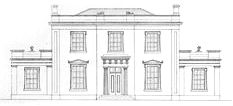Age
This is never stated, though we know he has a daughter in her late 20’s, so he’s likely close to 50, if not older.
Family and Situation
Sir William Lucas is married to Lady Lucas and is the father of Charlotte Lucas, Maria Lucas and at least one son. Based on the fact that Mrs. Bennet is sure he will make an effort to visit Bingley, as well as his generally congenially persona, it’s likely that he is engaged in ensuring his children's welfare.
Sir William seems to be a long-time resident of Hertfordshire, though his elevation to knighthood is quite recent. The narrator tells us “Sir William Lucas had been formerly in trade in Meryton, where he had made a tolerable fortune, and risen to the honour of knighthood by an address to the king during his mayoralty. The distinction had perhaps been felt too strongly. It had given him a disgust to his business, and to his residence in a small market town; and, in quitting them both, he had removed with his family to a house about a mile from Meryton, denominated from that period Lucas Lodge, where he could think with pleasure of his own importance, and, unshackled by business, occupy himself solely in being civil to all the world.” We know that Sir William was later presented at St. James’s Court, suggesting he’s spent at least some time in London. Since Sir William appears to be able to live at Lucas Lodge as a gentleman, he likely either has robust investments or had amassed a significant fortune in his career.
Appearance
Mrs. Bennet says that Sir William is “So much the man of fashion” before making a point in front of Darcy about how polite he is. As Mrs. Bennet’s taste is not generally the most discerning, it is likely that Sir William is not on the cutting edge of fashion, but sets the high water mark in provincial Meryton.
Character
We know that Sir William Lucas is easily impressed by lofty titles and social grandeur; his retirement from trade and frequent references to St. James’s suggests that he really does aspire to the aristocratic lifestyle. When playing cards with Lady Catherine, we’re told “Sir William did not say much. He was storing his memory with anecdotes and noble names.”
On the other side, this seeming pretentiousness does not translate into rudeness. The narrator tells us that “though elated by his rank, it did not render him supercilious; on the contrary, he was all attention to everybody. By nature inoffensive, friendly, and obliging, his presentation at St. James's had made him courteous.” We know that he was once the Mayor of Meryton and even Mrs. Bennet concedes that he’s well-bred, suggesting that he’s generally quite well-liked.
When described from Lizzy’s point-of-view, it is clear that Sir William lacks the intellectual rigor she might prefer. At one point, we’re told “Elizabeth loved absurdities, but she had known Sir William's too long. He could tell her nothing new of the wonders of his presentation and knighthood; and his civilities were worn out, like his information.” At another point, he is described as being “empty-headed” like his younger daughter.
